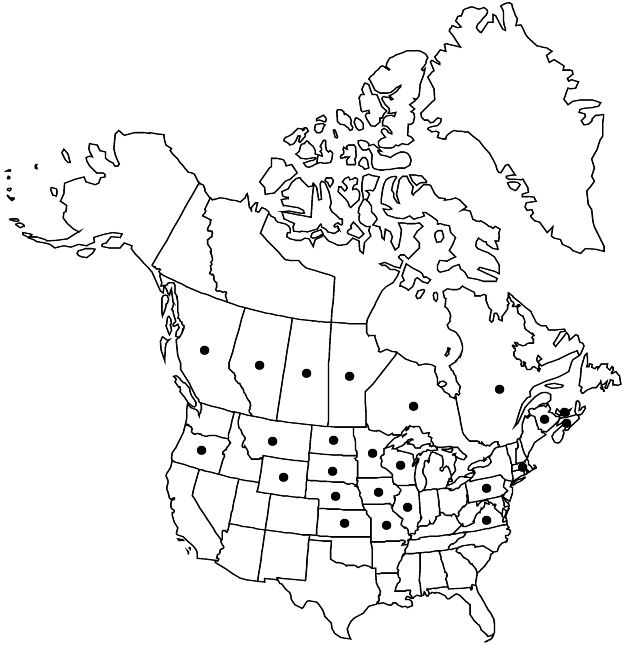Difference between revisions of "Malva pusilla"
in J. E. Smith et al., Engl. Bot. 4: plate 241. 1795.
FNA>Volume Importer |
imported>Volume Importer |
||
| (3 intermediate revisions by 2 users not shown) | |||
| Line 1: | Line 1: | ||
{{Treatment/ID | {{Treatment/ID | ||
|accepted_name=Malva pusilla | |accepted_name=Malva pusilla | ||
| − | |accepted_authority=Smith | + | |accepted_authority=Smith |
|publications={{Treatment/Publication | |publications={{Treatment/Publication | ||
|title=in J. E. Smith et al., Engl. Bot. | |title=in J. E. Smith et al., Engl. Bot. | ||
| Line 28: | Line 28: | ||
|elevation=100–1000 m | |elevation=100–1000 m | ||
|distribution=Alta.;B.C.;Man.;N.B.;N.S.;Ont.;P.E.I.;Que.;Sask.;Ill.;Iowa;Kans.;Mass.;Minn.;Mo.;Mont.;Nebr.;N.Dak.;Oreg.;Pa.;S.Dak.;Va.;Wis.;Wyo.;Europe. | |distribution=Alta.;B.C.;Man.;N.B.;N.S.;Ont.;P.E.I.;Que.;Sask.;Ill.;Iowa;Kans.;Mass.;Minn.;Mo.;Mont.;Nebr.;N.Dak.;Oreg.;Pa.;S.Dak.;Va.;Wis.;Wyo.;Europe. | ||
| + | |introduced=true | ||
|discussion=<p><i>Malva pusilla</i> appears to be more cold-tolerant than <i>M. neglecta</i> and is often confused with it and tends to replace it in the north. In most older treatments, it was included within <i>M. rotundifolia</i>, a name rejected because of its inconsistent use for this as well as for <i>M. neglecta</i> and other species. Reports of <i>M. pusilla</i> in older floras of California and some southern states probably are based on misidentifications. It is found only occasionally but it is probably more widely distributed in the flora area than the records indicate.</p> | |discussion=<p><i>Malva pusilla</i> appears to be more cold-tolerant than <i>M. neglecta</i> and is often confused with it and tends to replace it in the north. In most older treatments, it was included within <i>M. rotundifolia</i>, a name rejected because of its inconsistent use for this as well as for <i>M. neglecta</i> and other species. Reports of <i>M. pusilla</i> in older floras of California and some southern states probably are based on misidentifications. It is found only occasionally but it is probably more widely distributed in the flora area than the records indicate.</p> | ||
|tables= | |tables= | ||
| Line 37: | Line 38: | ||
-->{{#Taxon: | -->{{#Taxon: | ||
name=Malva pusilla | name=Malva pusilla | ||
| − | + | |authority=Smith | |
| − | |authority=Smith | ||
|rank=species | |rank=species | ||
|parent rank=genus | |parent rank=genus | ||
| Line 53: | Line 53: | ||
|publication year=1795 | |publication year=1795 | ||
|special status=Introduced | |special status=Introduced | ||
| − | |source xml=https:// | + | |source xml=https://bitbucket.org/aafc-mbb/fna-data-curation/src/2e0870ddd59836b60bcf96646a41e87ea5a5943a/coarse_grained_fna_xml/V6/V6_531.xml |
|subfamily=Malvaceae subfam. Malvoideae | |subfamily=Malvaceae subfam. Malvoideae | ||
|genus=Malva | |genus=Malva | ||
Latest revision as of 22:21, 5 November 2020
Herbs, usually annual, rarely biennial or perennial, 0.2–0.6 m, trailing stems sometimes to 1 m, sparsely hairy, hairs usually simple and stellate. Stems trailing to ascending, hairs usually both simple and stellate. Leaves: stipules persistent, narrowly to ovate-triangular, 3–5(–6) × 2–3 mm; petiole on proximal and midstem leaves to 3 times as long as blade, usually 2 times longer on distal leaves, sparsely hairy, hairs simple and stellate; blade cordate to broadly reniform, unlobed or broadly and very shallowly 5-lobed, 1–5 × 1–5 cm, base cordate, margins finely crenate or dentate, apex rounded, surfaces glabrous or sparsely stellate-hairy. Inflorescences axillary, flowers solitary or in 2–10-flowered fascicles (compact cymes), obviously stalked. Pedicels 0.4–0.5 cm, to 1–2.4 cm in fruit, slender and flexible, sparsely hairy, hairs simple and stellate; involucellar bractlets distinct, not adnate to calyx, linear to lanceolate, 3–4 × 0.5 mm, shorter than calyx, margins entire, surfaces sparsely ciliate and stellate-puberulent. Flowers: calyx 3–5 mm, 5–6 mm in fruit, lobes incompletely enclosing mericarps, mostly hispid, hairs both simple and stellate, conspicuously long-ciliate, lobes not obviously veined; petals pale pink or nearly white, drying pinkish or whitish, or faded, veins not darker, 3–6 mm, subequal to slightly longer than calyx; staminal column 1–1.5 mm, glabrous; style 10- or 11-branched; stigmas 10 or 11. Schizocarps 5–7 mm diam.; mericarps 10 or 11, 1.5–2 mm, margins sharply angled, toothed, not winged, lateral faces radially veined, apical surface strongly rugose-reticulate ridged, surface glabrate or sparsely stellate-puberulent. Seeds 1–1.5 mm. 2n = 42.
Phenology: Flowering May–Oct.
Habitat: Disturbed sites
Elevation: 100–1000 m
Distribution

Introduced; Alta., B.C., Man., N.B., N.S., Ont., P.E.I., Que., Sask., Ill., Iowa, Kans., Mass., Minn., Mo., Mont., Nebr., N.Dak., Oreg., Pa., S.Dak., Va., Wis., Wyo., Europe.
Discussion
Malva pusilla appears to be more cold-tolerant than M. neglecta and is often confused with it and tends to replace it in the north. In most older treatments, it was included within M. rotundifolia, a name rejected because of its inconsistent use for this as well as for M. neglecta and other species. Reports of M. pusilla in older floras of California and some southern states probably are based on misidentifications. It is found only occasionally but it is probably more widely distributed in the flora area than the records indicate.
Selected References
None.